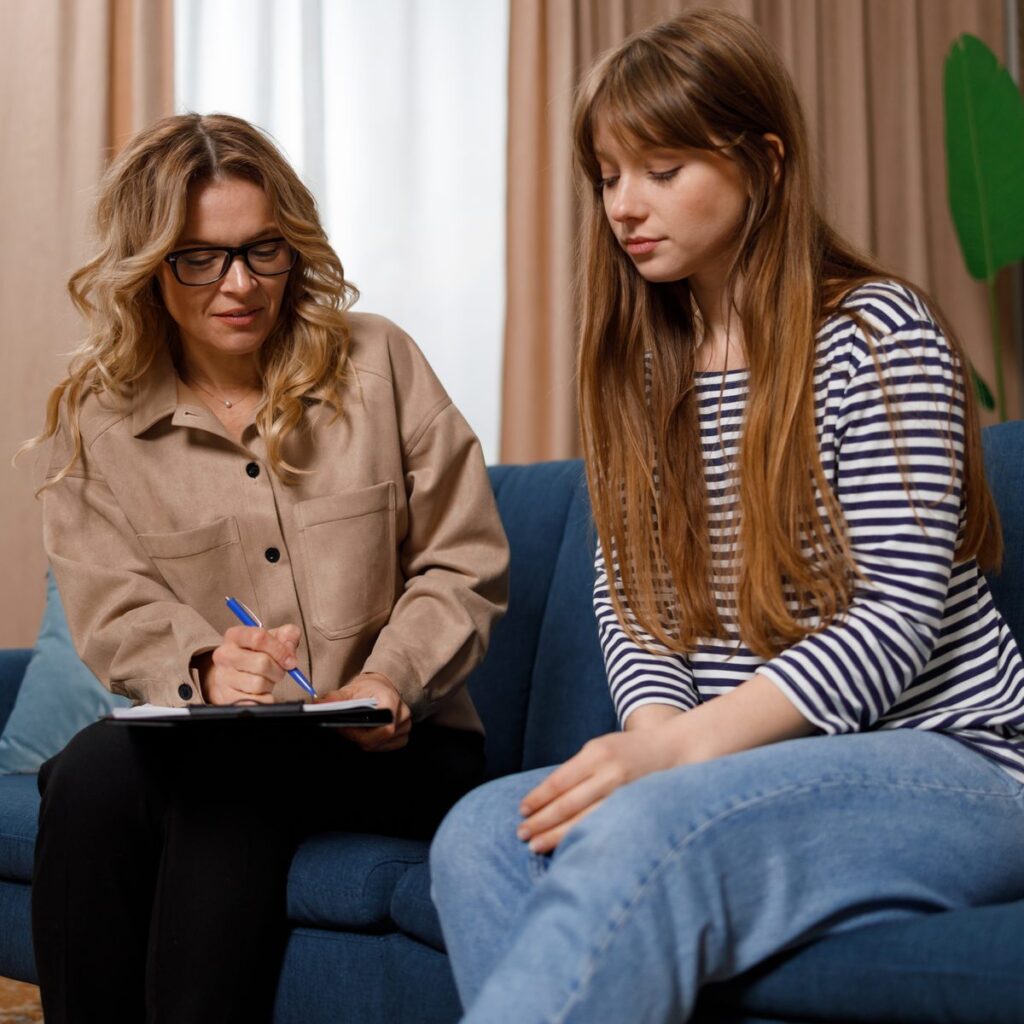- Is your child struggling with overwhelming anxiety or fear?
- Do obsessive thoughts and compulsive behaviors disrupt your child’s daily life?
- Does your child avoid situations or activities due to fear or anxiety?
- Are you seeking effective strategies to help your child overcome their anxiety-related challenges?
Exposure and Response Prevention (ERP) Therapy for Children with Anxiety and OCD
How ERP Can Help Your Child
As a parent, it can be deeply distressing to watch your child struggle with anxiety or OCD. Exposure and Response Prevention (ERP) therapy offers a proven approach to help children overcome these challenges and regain control of their lives.
Exposure and Response Prevention (ERP):
Exposure and Response Prevention (ERP) is a form of cognitive-behavioral therapy (CBT) specifically designed to treat anxiety disorders, particularly those involving obsessive-compulsive disorder (OCD). ERP involves gradually exposing children to their fears or triggers in a controlled and supportive environment while preventing them from engaging in their usual compulsive behaviors or rituals.
ERP has been shown to be highly effective in treating anxiety disorders and OCD in children. Research indicates that up to 70% of children who undergo ERP therapy experience a significant reduction in their symptoms, leading to improved daily functioning and overall well-being.

In ERP, our experienced therapists work collaboratively with children to identify their fears and compulsions. Through systematic exposure exercises, children are guided to confront their fears gradually, starting with less anxiety-provoking situations and gradually progressing to more challenging ones. By resisting the urge to perform compulsive behaviors, children learn that their fears are manageable and that they can tolerate anxiety without needing to rely on rituals.
A typical ERP session involves:
- Identifying triggers and feared situations
- Creating a fear hierarchy
- Gradual exposure to feared situations
- Preventing compulsive responses
- Processing the experience and building confidence
Our therapists guide children through each step, ensuring they feel safe and supported.
The importance of ERP lies in its ability to help children break the cycle of anxiety and compulsions, ultimately reducing their overall anxiety levels and improving their quality of life. By facing their fears in a structured and supportive manner, children gain confidence in their ability to cope with anxiety-provoking situations and develop more adaptive coping strategies.
The ERP Process: What to Expect
Therapeutic Approaches:
Our therapeutic approaches are tailored to meet the individual needs of each child and family. In addition to ERP, we integrate various evidence-based techniques and modalities, including cognitive-behavioral therapy (CBT), mindfulness-based interventions, and play therapy, to address various emotional and behavioral challenges.
For example, we might use CBT techniques to help children identify and challenge anxious thoughts, incorporate mindfulness exercises to manage stress and utilize play therapy to help younger children express their feelings and fears in a comfortable setting.
Through a collaborative and client-centered approach, our diverse team of licensed therapists empowers children to confront their fears, develop coping skills, and build resilience. We create a safe and supportive environment where children feel heard, understood, and empowered to make positive changes.
Success Story:
Sarah*, a 10-year-old with severe OCD, struggled with constant hand-washing that disrupted her school and home life. Through ERP therapy, Sarah gradually faced her contamination fears without washing. After 16 weeks of treatment, Sarah’s hand-washing reduced dramatically, and she reported feeling more in control of her fears. Her parents noted significant improvements in her confidence and overall happiness.
*Name of client changed to protect their privacy
Our Expertise:
Wellspring’s team features licensed therapists who specialize in treating anxiety disorders and OCD in children and adolescents. With advanced training in ERP and other evidence-based therapies, we stay current with the latest research and techniques to provide the most effective care for your child.
Frequently Asked Questions about ERP
ERP therapy can take many forms, depending on the child’s specific fears or compulsions. For example:
- A child with contamination OCD might be asked to touch a “contaminated” doorknob and resist the urge to wash their hands.
- A child with social anxiety might gradually practice speaking in front of larger groups of people.
- A child with separation anxiety might practice spending increasing amounts of time away from their parents.
While some ERP principles can be applied at home, professional guidance is strongly recommended, especially for children. A trained therapist can:
- Properly assess your child’s specific needs
- Create an appropriate exposure hierarchy
- Ensure exposures are done safely and effectively
- Provide support and adjustments as needed
Self-guided ERP may be less effective and overwhelming without proper guidance.
The duration of ERP therapy can vary depending on the severity of symptoms and the child’s progress. Many children see significant improvements within 12-20 weekly sessions. However, some may require more prolonged treatment. It’s important to note that:
- Early sessions focus on education and building the exposure hierarchy
- Progress is often gradual, with improvements building over time
- Some children may need occasional “booster” sessions after completing initial treatment
- Your child’s therapist will provide a specific timeline based on their needs and progress.
Take the First Step Towards Your Child's Anxiety-Free Future:
Ready to help your child overcome anxiety-related challenges? Schedule a complimentary 15-minute consultation with one of our experienced Client Care Coordinator today. Let our team of diverse, experienced, and licensed therapists partner with you to provide personalized and effective therapy for your child.
